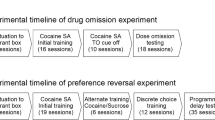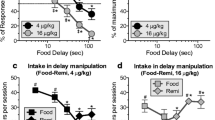Abstract
Rationale
Delaying presentation of a drug can decrease its effectiveness as a reinforcer, but the effect of delaying punishment of drug self-administration is unknown.
Objective
This study examined whether a histamine injection could punish cocaine self-administration in a drug–drug choice, whether delaying histamine would decrease its effectiveness, and whether the effects of delay could be described within a delay discounting framework.
Methods
Monkeys were implanted with double-lumen catheters to allow separate injection of cocaine and histamine. In discrete trials, subjects first chose between cocaine (50 or 100 μg/kg/inj) alone and an injection of the same dose of cocaine followed immediately by an injection of histamine (0.37–50 μg/kg). Next, they chose between cocaine followed immediately by histamine and cocaine followed by an equal but delayed dose of histamine.
Results
When choosing between cocaine alone and cocaine followed immediately by histamine, preference increased with histamine dose from indifference to >80% choice of cocaine alone. When choosing between cocaine followed by immediate histamine and cocaine followed by delayed histamine, monkeys showed strong position preferences. When delayed histamine was associated with the nonpreferred position, preference for that option increased with delay from ≤30% to >85%. The corresponding decrease in choice of the preferred position was well described by a hyperboloid discounting function.
Conclusions
Histamine can function as a punisher in the choice between injections of cocaine and delay can decrease its effectiveness as a punisher. The effects of delaying punishment of drug self-administration can be conceptualized within the delay discounting framework.



Similar content being viewed by others
References
Ainslie G (2001) Breakdown of will. Cambridge University Press, Cambridge
Azrin NH, Holz WC (1966) Punishment. In: Honig WK (ed) Operant behavior: areas of research and application. Prentice-Hall Inc., Englewood Cliffs, pp 380–447
Baron A (1965) Delayed punishment of a runway response. J Comp Physiol Psychol 60:131–134
Bergman J, Johanson CE (1981) The effects of electric shock on responding maintained by cocaine in rhesus monkeys. Pharmacol Biochem Behav 14:423–426
Bickel W, Marsch LA (2001) Toward a behavioral economic understanding of drug dependence: delay discounting processes. Addiction 96:73–86
Carroll ME, Anker JJ, Mach JL, Newman JL, Perry JL (2010) Delay discounting as a predictor of drug abuse. In: Madden GJ, Bickel WK (eds) Impulsivity: the behavioral and neurological science of discounting. American Psychological Association, Washington, pp 243–271
Coffey SF, Gudleski GD, Saladin ME, Brady KT (2003) Impulsivity and rapid discounting of delayed hypothetical rewards in cocaine-dependent individuals. Exp Clin Psychopharm 11:18–25
Cohen PS (1968) Punishment: the interactive effects of delay and intensity of shock. J Exp Anal Behav 11:789–799
Deluty MZ (1978) Self-control and impulsiveness involving aversive events. J Exp Psychol Anim Behav Process 4:250–266
Estle SJ, Green L, Myerson J, Holt DD (2006) Differential effects of amount on temporal and probability discounting of gains and losses. Mem Cogn 34:914–928
Freeman KB, Green L, Myerson J, Woolverton WL (2009) Delay discounting of saccharin in rhesus monkeys. Behav Proc 82:214–218
Freeman KB, Wang Z, Woolverton WL (2010) Self-administration of (+)-methamphetamine and (+)-pseudoephedrine, alone and combined, by rhesus monkeys. Pharmacol Biochem Behav 95:198–202
Goldberg SR (1980) Histamine as a punisher in squirrel monkeys: effects of pentobarbital, chlordiazepoxide, and H1- and H2- receptor antagonsist on behavior and cardiovascular responses. J Pharmacol Exp Ther 214:726–736
Green L, Myerson J (2004) A discounting framework for choice with delayed and probabilistic rewards. Psychol Bull 130:769–792
Green L, Myerson J, Holt DD, Slevin JR, Estle SJ (2004) Discounting of delayed food rewards in pigeons and rats: is there a magnitude effect? J Exp Anal Behav 81:39–50
Grove RN, Schuster CR (1974) Suppression of cocaine self-administration by extinction and punishment. Pharmacol Biochem Behav 2:199–208
Holt DD, Green L, Myerson J, Estle SJ (2008) Preference reversals with losses. Psychon Bull Rev 15:89–95
Iglauer C, Woods JH (1974) Concurrent performances: reinforcement by different doses of intravenous cocaine in rhesus monkeys. J Exp Anal Behav 22:179–196
Johanson CE (1977) The effects of electric shock on responding maintained by cocaine in a choice procedure in the rhesus monkey. Psychopharmacology 53:277–282
Johanson CE, Schuster CR (1975) A choice procedure for drug reinforcers: cocaine and methylphenidate in the rhesus monkey. J Pharmacol Exp Ther 193:676–688
Katz JL, Goldberg SR (1986) Effects of H1-receptor antagonists on responding punished by histamine injection of electric shock presentation in squirrel monkeys. Psychopharmacology 90:461–467
Lattal KA (2010) Delayed reinforcement of operant behavior. J Exp Anal Behav 93:129–139
Madden GJ, Petry NM, Badger GJ, Bickel WK (1997) Impulsive and self-control choices in opioid-dependent patients and non-drug-using control participants: drug and monetary rewards. Exp Clin Psychopharm 5:256–262
Mazur JE (1987) The effect of delay and intervening events on reinforcement value. In: Commons ML, Mazur JE, Nevin JA, Rachlin H (eds) Quantitative analyses of behavior, vol 5. Lawrence Erlbaum and Associates, Hillsdale, pp 55–73
Mazur JE (2000) Tradeoffs among delay, rate, and amount of reinforcement. Behav Proc 49:1–10
Murphy JG, Vuchnich RE, Simpson CA (2001) Delayed reward and cost discounting. Psych Rec 51:571–588
Myerson J, Green L (1994) Discounting of delayed rewards: models of individual choice. J Exp Anal Behav 64:263–276
Negus SS (2005) Effects of punishment on choice between cocaine and food in rhesus monkeys. Psychopharmacology 181:244–252
Odum AL, Madden GJ, Bickel WK (2002) Discounting of delayed health gains and losses by current, never- and ex-smokers of cigarettes. Nicotine Tob Res 4:295–303
Perry JL, Carroll ME (2008) The role of impulsive behavior in drug abuse. Psychopharmacology 200:1–26
Perry JL, Larson EB, German JP, Madden GJ, Carroll ME (2005) Impulsivity (delay discounting) as a predictor of acquisition of IV cocaine self-administration in female rats. Psychopharmacology 178:193–201
Rachlin H (2006) Notes on discounting. J Exp Anal Behav 85:425–435
Reynolds B (2006) A review of delay-discounting research with humans: relations to drug use and gambling. Behav Pharmacol 17:651–667
Richards JB, Mitchell SH, de Wit H, Seiden LS (1997) Determination of discount functions in rats with an adjusting-amount procedure. J Exp Anal Behav 67:353–366
Woolverton WL (2003) A novel choice method for studying drugs as punishers. Pharmacol Biochem Behav 76:125–131
Woolverton WL, Anderson KG (2006) Effects of delay to reinforcement on the choice between cocaine and food in rhesus monkeys. Psychopharmacology 186:99–106
Woolverton WL, Myerson J, Green L (2007) Delay discounting of cocaine by rhesus monkeys. Exp Clin Psychopharm 15:238–244
Acknowledgments
This research was supported by the National Institute on Drug Abuse grant R21-DA-0026832 to WLW. Preparation of the manuscript also was supported in part by the National Institute of Mental Health Grant MH055308. We gratefully acknowledge Lee Hutson, Emily Partridge, and Jennifer Naylor for their expert technical assistance.
Conflict of interest
The authors have no conflicts of interest to disclose.
Author information
Authors and Affiliations
Corresponding author
Rights and permissions
About this article
Cite this article
Woolverton, W.L., Freeman, K.B., Myerson, J. et al. Suppression of cocaine self-administration in monkeys: effects of delayed punishment. Psychopharmacology 220, 509–517 (2012). https://doi.org/10.1007/s00213-011-2501-3
Received:
Accepted:
Published:
Issue Date:
DOI: https://doi.org/10.1007/s00213-011-2501-3




